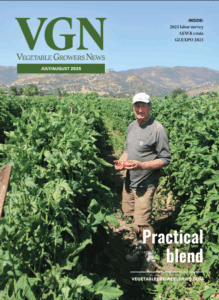
Feb 28, 2025Labor forum highlights 2024, future successes
That’s a wrap!
The 11th Annual Ag Employer Labor Forum held at the beautiful M Resort near Las Vegas is in the books and will be remembered for many things.
Once again, the event sold out as more than 420 attendees and more than 200 companies came together to hear discussions, panels and presentations on topics ranging from economics, farm safety, litigation and opportunities to use robots in agriculture and demonstrations.
Visitors had the opportunity to walk through the sold-out trade show and visit with representatives of foreign labor ministries, software companies and experts in transportation and logistics as well as ethical recruitment. Government agencies spurred conversations on compliance with often convoluted and conflicting regulations.
One of the many highlights from the event for anyone who might be a numbers person was a presentation by Alexandra Hill, who holds a doctorate from the University of California at Berkeley. Her recent research analyzed data from the Department of Labor’s (DOL) National Agricultural Workers Survey (NAWS) in California.

A couple of years ago, California put into place new overtime regulations for agricultural workers in the state. Of course, not only did the farmers object but farmworkers did as well. Both employers and the employees had testified before the legislature that worker take-home pay would be reduced as farmers couldn’t afford overtime.
Union organizers scoffed at the notion, perhaps believing that farm and ranch families have some ability to pass along costs added by government whim. Hill’s research proved that the farmers and workers knew what they were talking about in their testimony before the legislature. Overtime regulations reduced worker take home pay dramatically.
Hill’s latest analysis, shared at the Labor Forum, validates concerns raised by NCAE and our members with the Congress and the regulators. The costs of complying with the H-2A regulations, including wages that must be paid, are eliminating the opportunity for profit in labor-intensive agriculture. Put another way, and consistent with the claims made by NCAE since 2017, for every apple, cherry, cucumber, tomato, orange, strawberry, or blueberry harvested in the U.S., employers are losing equity in their legacy operations. This is unsustainable.
While Congress has been reluctant to perform its duty, agency regulators have been more than happy to regulate away.

A panel of attorneys dissected the ins and outs of what we hope will be more litigation victories on the way. The panel discussed the recent successes enjoyed by farmworkers and employers alike in the injunctive relief federal district court judges ordered against the DOL’s worker protection rule in Georgia, Kentucky and Mississippi.
The Mississippi ruling made the injunction nationwide. All the cases were different, and all the injunctions were different as well. However, the unanimity of the relief provided by the courts in the different jurisdictions essentially echoed the comments made by NCAE to the DOL upon publication of the proposed regulation.
The attorney panel continued in examining NCAE’s litigation against the Adverse Effect Wage Rate (AEWR) in Florida and the companion cases brought in North Carolina and Louisiana. Consensus seemed to be that after the magistrate in our case had recommended denial of our motion for a preliminary injunction against the rule by citing deference to the agency 15 times under the Chevron precedent, the court should have a new view of the challenge raised in light of the chief justice’s emphatic statement in the Loper Bright case decided last June that “Chevron is overruled.”
Another positive aspect of the forum was its look into the future of a new administration and a new Congress. Two guest speakers with decades of experience on Capitol Hill gave their crystal ball outlook to attendees and laid out pathways for ag employer success beginning in January 2025.
— Michael Marsh has led the National Council of Agricultural Employers since 2017. A Wyoming native and certified public accountant, Marsh worked for a CPA firm with farm and ranch clients investigating fraud. He was director of finance for the Almond Board of California for 7 years and for 15 years was CEO of the largest U.S. dairy producer trade association.
















